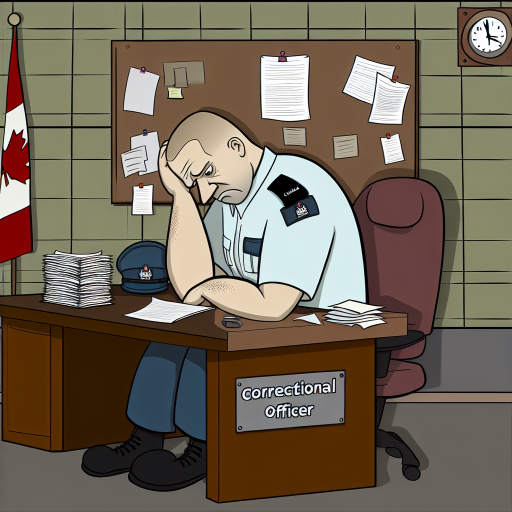Introduction to Veterans Affairs Officers and Their Role
Veterans Affairs Officers play a crucial role in supporting veterans.
Their primary responsibility is to assist veterans in navigating complex cases.
These officers help veterans understand their benefits and entitlements.
Additionally, they provide guidance for filing claims and appeals.
Veterans Affairs Officers also advocate for veterans’ needs and rights.
Moreover, they collaborate with various agencies and organizations.
This collaboration ensures that veterans receive comprehensive support.
Each officer possesses specialized knowledge in the system.
As a result, they are equipped to handle diverse cases efficiently.
They often engage in continuous training to stay updated.
Furthermore, these officers build strong relationships with veterans.
This connection fosters trust and facilitates effective communication.
Ultimately, their work positively impacts veterans’ lives.
By addressing individual concerns, they help improve overall wellbeing.
Thus, the role of Veterans Affairs Officers is multifaceted and vital.
Understanding the Complexity of Veteran Cases
The Impact of Diverse Backgrounds
Veterans come from various backgrounds, each bringing unique experiences.
These experiences shape their needs and challenges significantly.
Many veterans face unique health issues due to military service.
Additionally, family dynamics often add layers of complexity.
Legal and Administrative Challenges
Navigating the legal system can be overwhelming for veterans.
Veterans often deal with numerous regulations and policies.
This complexity can create confusion and frustration.
Furthermore, paperwork requirements can vary greatly.
Many veterans lack the necessary support to manage these demands.
Mental Health Considerations
Mental health remains a critical aspect of veteran care.
Unlock Your Career Potential
Visualize a clear path to success with our tailored Career Consulting service. Personalized insights in just 1-3 days.
Get StartedConditions such as PTSD can complicate case management.
Veterans may hesitate to seek help due to stigma.
Understanding these mental health challenges is essential for officers.
Appropriate training helps officers address these needs effectively.
Resource Accessibility
Access to resources impacts veterans’ ability to get help.
Some veterans live in rural areas with limited services.
Transportation barriers often hinder access to necessary appointments.
Moreover, funding issues can restrict available support programs.
Collaborative Efforts for Support
Veterans Affairs officers work collaboratively with other agencies.
Building relationships with community resources often proves beneficial.
Coordinating efforts enhances service delivery for veterans.
Moreover, involving veteran service organizations can provide additional support.
Adapting to Individual Needs
Each veteran’s situation requires a tailored approach.
Officers assess individual cases to determine specific needs.
Flexibility in service delivery enhances outcomes for veterans.
Personalized attention can make a significant difference.
Strategies Employed by Officers to Assess Individual Veteran Needs
Establishing Trust and Rapport
Building trust is key in veteran assessments.
Officers actively listen to veterans’ experiences.
They encourage open communication at all times.
This approach leads to accurate information sharing.
Furthermore, respect and empathy are vital components.
Gathering Comprehensive Background Information
Officers start by reviewing military history.
They collect medical records to understand health conditions.
Additionally, they assess personal circumstances affecting veterans.
This might include family dynamics and financial status.
Consequently, they gain a well-rounded view of needs.
Utilizing Assessment Tools and Questionnaires
Officers implement standardized assessment tools.
These tools help identify specific areas of need.
Questionnaires cover various domains, including mental health.
They provide structured ways to measure veteran concerns.
As a result, the assessment process becomes more effective.
Collaborating with Other Professionals
Teamwork is essential in addressing complex cases.
Officers reach out to mental health specialists when needed.
They engage social workers to aid in resource identification.
This collaboration offers comprehensive support for veterans.
Moreover, it ensures that all aspects of care are considered.
Following Up and Adjusting Support Plans
Regular follow-ups allow officers to monitor progress.
They adjust support plans based on changing needs.
Active involvement in the care process is crucial.
By staying engaged, they foster a supportive environment.
Ultimately, this leads to better outcomes for veterans.
Uncover the Details: Training Requirements for Canadian Correctional Officers
Collaboration with Healthcare Providers and Veteran Support Organizations
Importance of Collaborative Efforts
Veterans Affairs Officers actively collaborate with healthcare providers.
These partnerships enhance the support provided to veterans.
Effective collaboration leads to improved health outcomes.
Additionally, it opens avenues for a comprehensive care approach.
Engagement with Healthcare Professionals
Healthcare professionals play a crucial role in veteran care.
Veterans Affairs Officers work closely with doctors and nurses.
This collaboration ensures accurate health assessments.
Moreover, it helps identify veterans’ specific needs.
Building Relationships with Support Organizations
Veterans Affairs Officers engage with various support organizations.
These organizations provide essential resources for veterans.
For instance, they offer counseling and rehabilitation services.
Such support fosters a sense of community among veterans.
Coordinated Care Strategies
Coordinated care involves sharing vital information among providers.
Teams meet regularly to discuss veteran cases.
This approach ensures everyone is on the same page.
As a result, veterans receive cohesive and unified care.
Utilizing Technology for Enhanced Communication
Technology streamlines communication between parties involved.
Veterans Affairs Officers utilize secure messaging systems.
This allows for quick information sharing about veterans’ cases.
Furthermore, telehealth options have expanded access to care.
Training and Development Initiatives
Continual training enhances the skills of Veterans Affairs Officers.
Workshops include best practices in collaboration methods.
These initiatives prepare officers for complex case management.
Consequently, they become more effective advocates for veterans.
Evaluating the Impact of Collaboration
Evaluating the effectiveness of collaborative efforts is essential.
This includes gathering feedback from veterans and providers.
Surveys and assessments help identify areas for improvement.
Ultimately, the goal is to enhance the veteran experience.
Discover More: Understanding Confidentiality in Ombudsman Work
Use of Technology and Data Analysis in Case Management
The Importance of Technology
Technology plays a crucial role in managing complex cases.
It enhances efficiency and accuracy in case evaluations.
Moreover, it enables better communication among officers.
This technology-driven approach transforms traditional methods.
Data Analysis Techniques
Data analysis is essential for understanding veteran cases.
Officers utilize various tools to analyze case data.
These tools help identify trends and patterns.
Consequently, officers can make informed decisions quickly.
Case Management Software
Specialized case management software streamlines the process.
This software organizes data and tracks case progress efficiently.
Officers can access case histories and documentation easily.
Thus, they maintain a clear overview of complex cases.
Integration of Artificial Intelligence
Artificial intelligence is revolutionizing case management.
AI algorithms can predict case outcomes based on historical data.
This technology aids officers in prioritizing cases wisely.
Furthermore, it supports personalized veteran care strategies.
Collaboration and Communication Tools
Modern tools enhance collaboration among officers and stakeholders.
These platforms facilitate real-time communication and updates.
Improved collaboration leads to better case resolutions.
As a result, veterans receive timely assistance and support.
Training and Development
Continuous training on technology use is vital for officers.
This ensures they can fully leverage available tools.
Training enhances their skills in data analysis and interpretation.
Consequently, they become more effective in their roles.
Gain More Insights: Workplace Culture in Canadian Correctional Facilities
Legal and Policy Considerations in Navigating Cases
Understanding the Legal Framework
Veterans Affairs officers operate within a complex legal framework.
This framework comprises various laws and regulations that affect veterans.
Officers must stay informed about changes in legislation.
Additionally, they should understand how these changes influence case assessments.
Each case presents unique legal challenges requiring careful navigation.
Policy Implications
Policies guiding veterans’ benefits and services continuously evolve.
Officers must evaluate these policies to provide accurate guidance.
Through effective application of policies, they enforce veterans’ rights.
Moreover, understanding policy implications helps in making informed decisions.
Collaboration with Legal Experts
Collaboration with legal experts is crucial in complex cases.
Officers often consult attorneys specialized in veterans’ law.
Such consultations enhance their understanding of intricate legal issues.
Legal experts provide valuable insights into case strategy development.
Case Documentation and Evidence Gathering
Thorough case documentation is essential for legal compliance.
Officers must gather relevant evidence to support case claims.
Proper documentation mitigates risks associated with appeals.
Moreover, clear evidence helps to establish the legitimacy of the claims.
Training and Continuous Education
Ongoing training is vital for Veterans Affairs officers.
Workshops and seminars help them stay current with legal trends.
Continuous education enhances their problem-solving abilities.
Consequently, officers can navigate complex cases more effectively.
Advocacy and Support for Veterans
Advocacy remains a primary responsibility of Veterans Affairs officers.
They play a critical role in supporting veterans through complex processes.
This support may include guiding them on legal rights and benefits.
Additionally, clear communication promotes trust between veterans and officers.
Find Out More: Importance of Veterans Affairs Officers for Veterans

Challenges Faced by Veterans Affairs Officers in Complex Cases
Understanding the Complexity of Cases
Veterans Affairs officers often handle multifaceted cases.
These cases frequently involve various issues including health, benefits, and legal matters.
Officers must navigate through layers of bureaucracy to find resolutions.
Additionally, they deal with the emotional and psychological impacts on veterans and their families.
Limited Resources and Training
Many officers face constraints due to limited resources and training.
Budget cutbacks can reduce access to necessary support services.
Training programs may not cover all the unique scenarios officers encounter.
As a result, they often rely on their instincts and past experiences.
Communication Barriers
Effective communication is crucial in managing complex cases.
Officers frequently encounter language barriers and cultural differences.
Veterans from diverse backgrounds may not understand the jargon used in the system.
Consequently, clear explanations are essential for building trust and understanding.
Emotional Stress and Burnout
The emotional stress faced by officers can be substantial.
Dealing with veterans’ trauma can take a toll on their mental health.
Many officers experience burnout due to high caseloads and emotional demands.
Support systems within the department can help, but they are not always sufficient.
Legal and Regulatory Challenges
Legal complexities often complicate cases officers handle.
Veterans affairs systems involve an intricate web of regulations and laws.
Staying updated on changes in legislation adds to the difficulty.
Additionally, understanding the specifics of each case can impact outcomes significantly.
Strategies for Improvement
To address these challenges, many organizations seek improvement strategies.
Enhancing training programs can help officers develop necessary skills.
Investing in resources boosts support for both officers and veterans.
Creating a supportive work environment fosters resilience among officers.
Success Stories and Case Studies Illustrating Effective Navigation
Case Study: David’s Rehabilitation Journey
David served multiple tours overseas before returning home.
Upon his discharge, he faced numerous health issues.
The Veterans Affairs Officer assigned to him, Sarah, took immediate action.
She helped David navigate complex paperwork for his benefits.
Additionally, she connected him with medical specialists.
This connection was crucial for David’s rehabilitation.
Over time, David regained his health and confidence.
Ultimately, he became an advocate for fellow veterans.
Success Story: Maria’s Educational Pursuit
Maria was eager to further her education after serving in the military.
She approached her Veterans Affairs Officer, James, for guidance.
James reviewed her options for educational benefits with her.
He provided invaluable support throughout her enrollment process.
Moreover, he assisted her in locating scholarships specifically for veterans.
Thanks to James, Maria enrolled in a top university.
She graduated at the top of her class and found a fulfilling career.
Case Study: Brian’s Transition to Civilian Life
Brian struggled with the transition back to civilian life.
Recognizing his challenges, his Veterans Affairs Officer, Nicole, stepped in.
She arranged practical workshops focusing on job skills.
These workshops are tailor-made for veterans entering the workforce.
Through mentorship programs, Brian found a supportive community.
With assistance, he secured a job that matched his skills.
Today, Brian shares his journey to inspire others.
Success Story: Lisa’s Mental Health Advocacy
Lisa faced mental health challenges after her service.
Her Veterans Affairs Officer, Mark, showed empathy and understanding.
He guided Lisa to counseling services tailored for veterans.
Additionally, he introduced her to peer support groups.
These connections were essential for her healing process.
As a result, Lisa became a mental health advocate for veterans.
Now, she helps others facing similar struggles.
Key Takeaways from Successful Navigation
- Effective communication is vital for overcoming hurdles.
- Building supportive networks enhances individual resilience.
- Understanding available resources leads to successful outcomes.
- Advocacy plays a crucial role in empowering veterans.
Resources Available for Continuous Professional Development
Training Programs
Veterans Affairs officers benefit from various training programs.
These programs enhance their skills in case management.
Officers can attend workshops focused on specific issues.
Moreover, many organizations provide online courses.
Conferences and Networking Events
Conferences offer valuable opportunities for learning.
Officers can connect with peers and share experiences.
Networking fosters collaboration among professionals in the field.
Additionally, many conferences feature expert speakers.
Certifications and Credentials
Obtaining certifications can enhance an officer’s career.
Organizations provide certification programs tailored for veterans’ affairs.
Certifications demonstrate commitment to professional growth.
They also keep officers updated on best practices.
Professional Associations
Joining professional associations offers numerous benefits.
These associations provide resources and networking opportunities.
Members can access exclusive research and publications.
Additionally, they often host local events and workshops.
Online Resources and Communities
Online forums and communities facilitate sharing knowledge.
Officers can collaborate on challenging case scenarios.
Many websites provide access to relevant articles and research.
These resources keep officers informed about new policies.
Mental Health and Wellness Programs
Continuous wellness education is crucial for veterans’ affairs officers.
Many organizations offer programs supporting mental health.
These programs ultimately improve service delivery to veterans.
Additionally, wellness initiatives foster resilience among officers.
Additional Resources
H.R.2617 | Congress.gov | Library of Congress – Congress.gov
Military-to-Civilian Readiness: The Past, Present, and Future of the …




